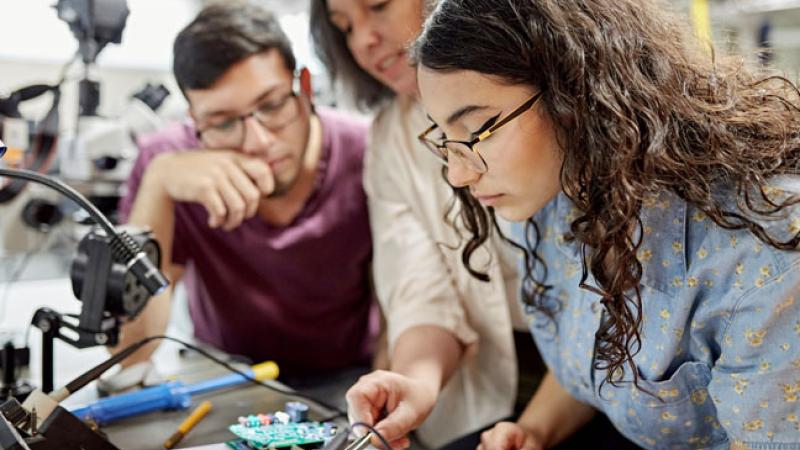June 11, 2024

The Undergraduate Department and the Teaching and Learning Collaboratory are excited to announce the winners of the 2024 seed project call for proposals. The purpose of the seed projects are to develop a project to the point that it is competitive for external funding. The projects test new pedagogical approaches or technologies that will impact student learning. The grants are in partnership with funding from Undergraduate Education and the Teaching and Learning Collaboratory. And to this point, we wish to extend a big congratulations to this year’s winners!
RECIPE for Success: Implementing Gameful Learning in Large Classes
RPI Gameful Learning Initiative aims to increase student motivation, engagement, and joy while learning. It focuses on creating game-like engagement in a learning environment. This proposal explores gameful learning approaches and scales them up for large lecture classes. Our proposed project incorporates interactive approaches, gaming, and remote laboratories.
This is a collaborative project between faculty members Lucy Cui and Leslie Zeng and their Game Development courses, Research Methods and Statistics course, and Intro to Psychological Science (Intro Psych) course. The project has two main components: piloting and scaling pedagogical innovations in gameful learning and teaching relevant technical and collaboration skills across majors through roleplaying industry jobs. Goals of the project are:
- To pilot and scale various gameful learning activities to large lecture classes.
- To prepare students for the workforce.
- To cultivate feelings of social connection, belongingness, and teamwork in students.
Team Members: Lucy Cui and Leslie Zeng
The world’s first cybersecurity VR CTF: A joint venture between RCC and RCOS
In 2020, the global cybersecurity workforce was facing an unprecedented projected employment gap of 3.5 million unfilled jobs by 2021. Today, in 2024, that gap has come to be realized almost exactly as predicted: the ISC2 2023 Cybersecurity Workforce Study estimates the employment gap to be 4 million unfilled jobs. Said best by them, “The profession needs to almost double to be at full capacity.”
The Rensselaer Cybersecurity Collaboratory (RCC) has already delivered innovative pedagogy. In order for RPI to realize its cybersecurity goals, the RCC and the Rensselaer Center for Open Source (RCOS) are partnering to present the following two goals: A world’s first innovative new pedagogy incorporating Virtual Reality (VR) using cybersecurity Capture-the-Flag (CTF) as a test platform; and Progress toward earning the NSA National Center for Academic Excellence in Cybersecurity (NCAE-C) designation. The VR CTF will present both the RCC and RCOS, discuss the critical need for a world’s first VR CTF, provide a pathway for additional usage for the VR CTF including a new cross-listed ITWS-CSCI course and development of cybersecurity awareness training for the campus community, and discuss how NCAE-C designation combined with our VR CTF translates into numerous funding opportunities.
Team Members: Brian Robert Callahan and Wes Turner
Mercer XLab STS-Engineering Research Fellowship Pilot Idea: Exploring personal instrumentation as a heutagogical tool for improvisational learning
The Mercer XLab stands at the beginning of a new wave of engineering education, one which is built on diversity of thought and the exploration of the differences among pedagogy (dependent learning), andragogy (independent, self-directed learning), and heutagogy (interdependent, self-direct learning). Innovation requires the integration of expertise from different perspectives at RPI to move toward a more holistic, more effective, and engaging educational experience for the learning community.
Thus, the proposed research fellowship is a bridge to enable the intentional engagement between the Humanities, Arts, and Social Sciences (HASS) and Engineering. Science and Technology Studies (STS), a discipline that exists at the intersection of many fields within the humanities and social sciences, is uniquely capable and situated to help supplement the Mercer XLab’s specific intersectional needs. STS is a field that studies the unique intersections of non-traditional learning and technology for the purpose of better understanding how diversity within communities can lead to innovation within technology. With initial success, the model of this work could expand to STS fellows with research partners in science, business, and architecture as it relates to their learning innovations. The research completed by an STS and an engineering Ph.D. student would enable the assessment of learning tools in engineering while providing the research fellows an opportunity to directly implement an aspect of their Ph.D. topic using the Mercer XLab as the connection to a learning testbed at RPI. Fellows will work with faculty PIs to apply theories and frameworks of education to study the advantages or disadvantages of an innovative learning tool provided to students. The result of the work not only provides constructive feedback from outside engineering while within RPI’s learning culture, but it also has the potential to give both the fellows and the pedagogical tool much-needed credibility to disseminate widely through publications and conferences.
Team Members: Shayla Sawyer, James Malazita, Dylan Rees, Jonathan Givan, and Vedran Beganovic